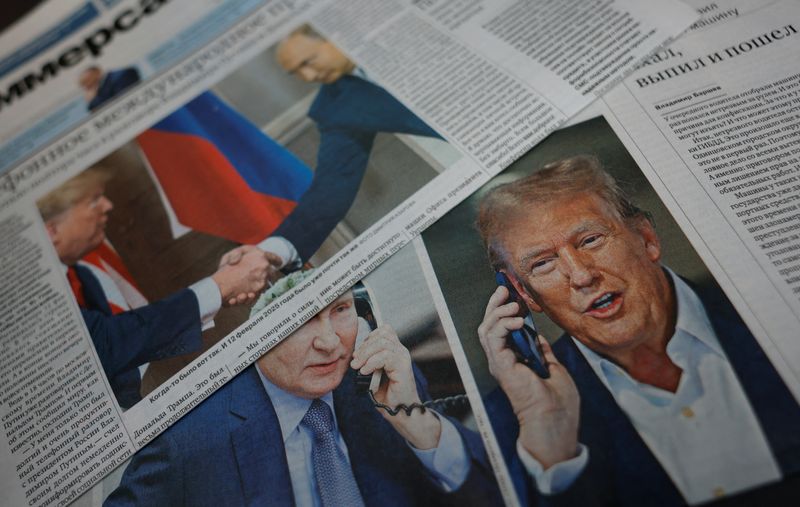Kremlin Suggests Putin and Trump May Have Spoken More Than Twice
Moscow — The Kremlin has confirmed that Russian President Vladimir Putin and former U.S. President Donald Trump may have engaged in more conversations than previously disclosed, after reports suggested their communications during Trump’s presidency were more frequent than the public record had indicated.
In a statement released on Friday, Kremlin spokesperson Dmitry Peskov acknowledged that the two leaders had maintained a line of communication throughout Trump’s time in office, but hinted that their interactions were not limited to the two known telephone calls that have been publicly acknowledged. “The number of conversations may have been more than two, but we do not comment on the specifics of private communications between leaders,” Peskov said.
The revelation comes as part of ongoing scrutiny into the nature of U.S.-Russia relations during Trump’s tenure, with several inquiries into the extent of interactions between Trump and Putin. The two leaders were often portrayed as having a close relationship, which led to both praise and criticism from various political factions in the U.S. and abroad.
Context of the Calls
Publicly, it has been reported that Trump and Putin spoke at least twice during his presidency — once in January 2017, shortly before Trump’s inauguration, and again in 2019 during a phone call that was later described as cordial but lacking substantial policy discussion. However, multiple sources have suggested that these calls may not be the only instances of direct communication between the two leaders.
The reports come amid new revelations from intelligence and diplomatic circles about the secretive nature of some communications between the U.S. and Russian leaders, raising questions about the level of transparency in their interactions. Trump’s relationship with Putin was frequently a point of contention throughout his presidency, especially given the ongoing investigation into Russian interference in the 2016 U.S. presidential election.
Potential Implications of the Communications
The suggestion that there may have been more conversations between Putin and Trump than previously acknowledged raises several potential concerns, particularly regarding the transparency of U.S.-Russia diplomatic channels. Some analysts argue that regular communications between the two leaders could have had significant implications for U.S. foreign policy, particularly during critical moments of international tension.
“Given the geopolitical significance of U.S.-Russia relations, any private conversations between Trump and Putin would have been closely scrutinized,” said Dr. Ivan Mikhailov, a senior fellow at the Carnegie Moscow Center. “This revelation may indicate that Trump’s approach to Russia was more nuanced and complicated than previously understood, and it raises questions about the broader implications for U.S. foreign policy during his administration.”
In particular, questions have been raised about the nature of the discussions surrounding key issues such as Syria, Ukraine, and the 2016 election. Trump was often criticized for his reluctance to confront Putin directly on matters of Russian interference and global security concerns, and the frequency of their communications could provide new insight into the dynamics of this controversial relationship.
Trump’s Response
In response to the Kremlin’s comments, Trump’s spokesperson issued a brief statement affirming that the former president had maintained regular communication with world leaders during his tenure. “President Trump had conversations with many world leaders, including President Putin, as part of his efforts to advance American interests on the global stage,” the statement read. “Any discussions were always aimed at promoting peace and stability.”
Trump has previously denied any improper relationship with Russia or its leadership, and his allies have consistently argued that his stance on Russia was often misrepresented by critics. Nonetheless, the revelations continue to fuel ongoing debates in both the U.S. and Russia about the true nature of the former president’s foreign policy approach.
Ongoing Investigations and Public Perception
The issue of Trump’s interactions with Putin is likely to remain a topic of public and political debate as investigations into Russian interference in U.S. elections and potential foreign influence continue. Many members of Congress have called for further scrutiny of the communications between the two leaders, especially given the ongoing security concerns related to Russian actions in Ukraine and other regions.
The release of this new information has sparked renewed questions about the transparency of the Trump administration’s dealings with Russia, with some lawmakers demanding more information about the content and frequency of communications between the two men.
In the U.S., the revelations have led to a mixture of skepticism and curiosity, with some critics alleging that the full scope of Trump’s relationship with Putin may never be fully understood. “There is a long history of secrecy surrounding Trump’s dealings with Putin, and it remains unclear whether the full picture will ever emerge,” said Senator Elizabeth Warren, a vocal critic of the former president’s approach to Russia.
Conclusion
As the investigation into the Trump-Putin communications continues, the Kremlin’s admission that there may have been more than two conversations between the leaders raises important questions about the depth of their relationship and its impact on global geopolitics. The nature and frequency of their interactions could shape the future understanding of U.S.-Russia relations during Trump’s presidency and may provide new insights into the complex web of international diplomacy. For now, the full details of these private communications remain shrouded in secrecy, leaving many questions unanswered.
